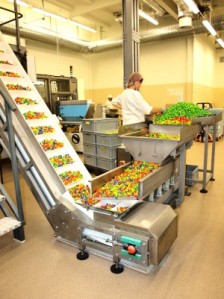The current word of choice among those making theatre, for the theatre workplace, is definitely industry. It has become the default – so widely accepted that young students and not-so-young practitioners just refer to it as ‘the industry,’ dropping any reference to theatre, acting or even performance. In this post, I want to ask what unspoken assumptions go with that word, industry, and what the alternatives might imply.

Image credit: ryanking999 / 123RF Stock Photo
I’ll admit it up front, I’ve never been a fan of the term industry since the Queensland University of Technology dropped the term art(s) in exchange for Creative Industries. Ultimately, you can of course call it what you want, but I think it’s prudent to be aware that what you call it affects how you perceive it, and how others perceive it, and legitimises a particular view of how theatre does and ought to work.
I want to consider five terms: industry, profession, trade, sector and community.
The Industry
This term is chosen because of the perception that it lends a gravity to the endeavour, and a socio-political value, that is believed to be absent from the word artform. That belief is in itself worthy of its own article, but I leave it for another time.
What concern me are the unspoken implications about structure and power that are inherent in the word industry, and what these mean for the arts and who controls them. The term industry, more usually and traditionally, is applied to such things as mining, manufacture and retail. Each of these follows a true industrial model. In an industry, the means of labour are not owned by the same people that own the means of production. Those who own the means of production (mining corporations, factory owners, and shop-owners – which are increasingly corporations, not individuals), do not labour in the industry. Rather they employ labourers who, skilled or unskilled, are essentially interchangeable and have little or no stake in how production happens. They are paid for their labour, but the profits, and the risks, belong to those who own the means of production.

Image credit: myszolow / 123RF Stock Photo
Applied to theatre, this gives us the corporatised theatre company. Size is not at issue, a corporatised theatre company may be small or large, and owned privately or by the state. The important point is that the financial risk and benefit largely accrue to the producers, who are not artists (or at least not functioning as artist in this capacity), while artists are mere operatives within the industry. This is a model, and may well be a viable model. I am not interested here in whether it’s a desirable model or not. I just want to underline that every time you refer to theatre as an industry or the industry, you are (consciously or otherwise) reinforcing this model of economic structure.
The Profession
I haven’t heard too many people recently refer to theatre-making, or even acting, as a profession, though I have heard the word unprofessional bandied about quite a lot – more so than its affirmative counterpart professional. Unfortunately, while it fills the people who say it with a sense of righteousness, it seems to be utterly meaningless. Most people use the label unprofessional to refer to behaviour of which they don’t approve, or which has impacted negatively upon them, but without any clear reference point. As I did for industry, I’d like to consider some of the more canonical uses of the word profession. The term profession proto-typically refers to pursuits which include medicine, law, journalism, and psychology. Each of these is governed by a professional association, with its own published code of conduct. That’s what makes it a profession. In these domains, the term professional means ‘within the bounds of the published code of conduct agreed upon by the professional association’ and unprofessional refers to behaviour that transgresses the code. Not only is there a professional association, everyone who claims to be a member of a given profession is required to belong to that association, and has agreed to the code of conduct.

Image credit: wavebreakmediamicro / 123RF Stock Photo
Regardless of whether you think this would be a good idea or not, theatre currently does not meet any of these criteria and has none of the attributes of a profession. Rather it comes close to the conditions of a trade (see below). However, some elements of the theatre sector may well aspire to the status of a profession. Theatre ensembles may well operate in this regard, with agreed on membership with rights and responsibilities accruing to members, and with written and agreed upon codes of conduct (yes, yes, the Queensland Shakespeare Ensemble has these things).
What is the economic structure of a profession? Within a profession such as medicine, law, or psychology, professionals may work within an industrial model, providing labour for some profit-making/risk-taking owner of the means of production. However, there are two big differences. In most cases where this occurs, the owner of the means of production is herself a member of the profession. The head of a legal chamber(s) or law firm is usually a lawyer. The owner of a medical clinic is typically a medical practitioner, and so forth. Secondly, there are independent operators in almost all professions, who own both the means of labour and the means of production.
The Trade
It’s probably been decades, if not a century, since anyone involved in theatre talked about it as a trade. Theatre seems to have left its working class roots well behind it, with aspirations and pretensions to upper-middle class organisational and managerial styles. However, a trade may be found within an industry, or within a profession, for that matter.
A trade, the term proto-typically assigned to the realm of electricians, plumbers and builders, is an (often unofficial) organisation of independent contractors who work, typically freelance, for a number of different owners of the means of production. They have greater independence than employees in an industry, but less control over the nature of the work that they do than those in a profession (though they do generally choose whether to take a given offer of work or not). Most ‘jobbing actors’ would qualify as tradespeople.
Within the Renaissance theatre in England, for example, we can see both members of a trade and professionals. Sharers were artists who assumed the risk and collected any profit – they owned the theatre and created the performances that took place in it. Alongside sharers, any number of journeymen worked. These were artists hired for a fixed fee or wage, who did not own the means of production but who were paid for their work. The term journeyman actually means ‘tradesman’ (and the organisation also boasted any number of apprentices, who might aspire to become journeymen and possibly, one day, sharers).

Image credit: davidmartyn / 123RF Stock Photo
Another hallmark of a modern trade is that its members form associations typically called unions or guilds. These do not seek to regulate the behaviour of their members in the way that professional associations do, but rather exist to advocate for their members within a work context in which they do not own the means of production. In Australia, these organisations are no longer (allowed to be) exclusive or closed shop.
Actors Equity, in its various guises around the world, functions as a trade union and not as a professional association.
The Sector
You won’t hear too many folks who make theatre refer to ‘the sector’ but it’s definitely the preferred term for funding agencies such as Arts Queensland. In and of itself a fairly neutral term, it still has some unspoken implications. The term sector effectively marginalises artistic practice, and separates it from its social and political roots. The terms is unique among the terms under consideration here for being a metaphorical extension of a geometric term, and it’s implications remain one of a ‘zone’ or boundaried sub-part. A sector does not intersect with other sectors and its parts are concentrated into one area, not distributed throughout the whole.

Image credit: elnur / 123RF Stock Photo
The metaphor is not innocent, as I will illustrate with one example. Some years ago, an application of ours was knocked back for funding, not in itself unusual, though the feedback was telling. The application was for a project in which a small team of artists worked with up to twenty prisoners over three months, and culminated in a theatrical performance within the prison. The feedback was while the project looked worthwhile for the prisoners, there was no evident Arts outcome. On elaboration, the funding agency said that it was not clear that there was any benefit to the arts sector. You might want to read that again – an arts funding agency considers its role is limited to funding work that os of direct benefit to the arts. This comes directly from the compartmentalising sector mentality. It is small wonder that many people consider the arts to be a self-serving waste of time, when peak funding bodies consider that their job is simply to look after the interests of the sector itself. The Sector mentality makes it very difficult to argue for any broader benefit to the arts, or for any integration of artistic with other community practice.
The Community
Artists who have worked with me will not be surprised to hear that this is my preferred term for theatre. Community acknowledges a commonality of purpose but also permits of a diversity of agendas and of forms of socio-political and economic organisation. Within a theatre community we may find all of the following:
• industrial theatre: artists are workers within a company owned and run by people whose jobs are non-artistic (they may be artists too, as I believe all people are, but there are distinct non-artistic roles within the organisation)
• professional theatre: artists control both the means of production and the means of labour. They own and run the companies which employ them. Each organisation has a professional code of conduct to which its members contribute and adhere.
• theatre trade: freelance artists belong to a union which advocates for their rights as they exchange labour for capital.

Image credit: tonybaggett / 123RF Stock Photo
These models are not necessarily mutually exclusive. The key is that in a theatre community, none of these is perceived as superior to or takes precedence over any other. The community values diversity of structure, seeing it as strength. Audiences and artists alike are able to participate in whichever model or models appeal to their values and their tastes, without stigma.
What about “vocation” as in entering a priesthood; or perhaps “addiction” morphed into a collective noun 🙂
Professional! Pro = for, fesh = fesh, on = a state of, al = cohol. Professional = one who drinks like a fesh!
Very useful distinctions there, Rob! Thank you!
Whilst I have been talking for a long time about arts and film needing to function like communities, amongst the broader community, I have still been referring to them as ‘industries’. This is no doubt largely thanks to the uni miseducation of myself and my colleagues. Agh. The power of the lexicon.
Nice analysis Rob. Until ‘industry’ became the term of choice (I think partly in response to government insistence on theatre companies around Australia becoming more business-like/efficient – pre-Nugent Report time) it was ‘professional’ or ‘amateur’ that ruled the roost.
‘Community theatre’ was another term which made its appearance again, I think, as a result of governmental insistence when allocating funding – arts as community building.
As to ‘professional,’ granted, it is a term that gets flogged around by everyone to mean a couple of things. Like you, I understand it to stand as a descriptor of a self-regulating group with codes of conduct (written or unwritten), certain expectations of and by its membership, but also with a sense of the old ‘profession’ of a life as in religious societies.
As an aside, I’ve been aware of another word ‘artist’ and its sibling ‘creative’ which have started becoming more and more common here in Australia, I suspect in reaction to those ‘industrial’ connotations.
Independent ‘theatre-makers’ (a nice democratic descriptor) might not use the term ‘sharers’ but that’s a pretty fair indication of what they (aim to) do, and ‘journeyman’? Well, I remember Bille Brown saying he was a jobbing actor up to the end. Not a bad thing to be, eh?
Nice summary, mate, although I wonder about your definition of “journeyman” as being “tradesman”. I always assumed the term to have derived from the French word “journée”, which means (after a fashion) “day”, and that a journeyman was someone who got paid by the day – i.e. a casual labourer. Happy to stand corrected though, if I am wrong. No gripes with your central premise though – the language we use absolutely dictates the way we view things. No denying it; that’s why politicians of all hues seek to describe things in language favourable to their onw views.
Quite right about the etymology there, Gareth. I took a short-cut in my explanation, too short a cut on reflection. The notion of day-labourer became our notion of contractor.